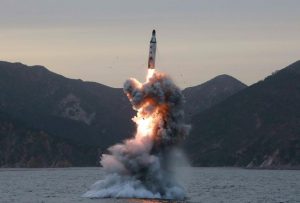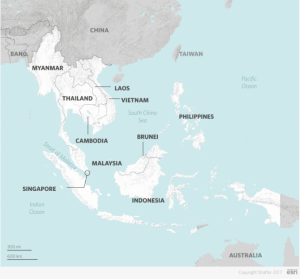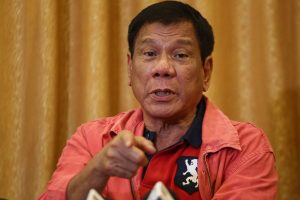 While I was in China last week, the apparent failure of a missile test by North Korea was on the news and while I could not follow the audio, which I think was in Mandarin, the visuals were very clear. Clearly the North Korean situation is a danger to the 51 million people in South Korea and especially the 10 million or so who live in the capital which is just 60 Km (35 Miles) from the border.
While I was in China last week, the apparent failure of a missile test by North Korea was on the news and while I could not follow the audio, which I think was in Mandarin, the visuals were very clear. Clearly the North Korean situation is a danger to the 51 million people in South Korea and especially the 10 million or so who live in the capital which is just 60 Km (35 Miles) from the border.
Looking at the longer term, however, it seems to me that the evolving situation between China and the ASEAN countries is a bigger threat to the region.
The Association of South East Asian Nations (ASEAN) turns 50 this year and just released its annual Chairman’s statement prepared by the current Chairman, Rodrigo Duterte, the President of the Philippines. The statement is significant mainly for its lack of criticism concerning China’s continued expansion in the South China Sea and disregard for a ruling on the issue by the International Tribunal for the Law of the Sea in The Hague.
ASEAN
The original founders of ASEAN were pro western dictatorships that had come to power in Thailand, Indonesia, Malaysia, Singapore and the Philippines. At the height of the war in Vietnam in 1967, these countries founded the organization and ten years later created a secretariat in Jakarta and began the process of building network of transnational agencies with different offices in different countries such as centers for disaster relief, energy, biodiversity, meteorology, etc. Brunei joined the group in 1984 and Viet Nam, Lao PDR, Myanmar and Cambodia at the end of the last century.

Since 2003, ASEAN has also been developing the ASEAN Free Trade Area (AFTA) which is working to lower tariffs across the region on a wide range of goods and services. Currently there is considerable work being done to expand the idea and create an East Asian Community along the lines of the EU.
The Chairman’s statement, which can be found in its entirety here, consists of 124 articles over 25 pages covering all aspects of the organization’s development spanning a wide array of topics, initiatives, and framework agreements. Article 100, for example, re-iterated the group’s commitment to the Paris Agreement on Climate Change.
With respect to the South China Sea the Chairman’s message was reportedly revised to soften the language concerning China’s activities and to delete any mention of the ruling by the International Tribunal. Article 120 sates that the ASEAN leaders “reaffirmed the importance of maintaining peace, stability, security, and freedom of navigation and over flight” in the South China Sea and “took note of concerns expressed by some leaders over recent developments in the area”.
Article 121 made explicit reference to the 2002 agreement, made between China and the ASEAN nations which specifically calls for the parties to refrain “from action of inhabiting on the presently uninhabited islands, reefs, shoals, cays, and other features” which is exactly what China has been doing.
Regional In-security
While ASEAN has been focused on building economic and cultural cooperation, the military security of the region has largely been left to the United States and its network of military agreements which involve different levels of cooperation and bases in Australia, India, Japan, Indonesia, Philippines, Singapore, Taiwan, Thailand, and New Zealand.
The degree to which this military cooperation will be sustained over time is one of the key issues facing the region in the next 10-20 years as the Trump administration has appeared to be ambivalent about its commitment to the defense of South East Asia.
Rodrigo Duterte

The President of the Philippines is perhaps best known for his war on drugs in which he has authorized the police to use lethal force and has resulted in over 7-8,000 deaths since he took office 10 months ago. The Vice President of the Philippines, Leni Robredo has come out strongly against the extrajudicial killings and recently resigned from the Cabinet.
What is less well known is Duterte’s apparent environmental convictions. he appointed a leading environmentalist, Gina Lopez, as his Acting Secretary for the Environment and she is currently in the process of enforcing long neglected laws on the country’s Nickel mining industry as reported by the New York Times.
In geo-political terms, Duterte has questioned the historic links between the Philippines and the United States and has apparently moved closer to China which has not only promised to help finance needed infrastructure in thePhilippines apparently in exchange for accepting Chinese hegemony in the South China Sea. China has also not made any criticism of Duterte’s lethal approach to the drug problem unlike Barak Obama who expressed deep concern.
According to the BBC, Donald Trump, “enjoyed” a conversation with Duterte last Saturday and has invited him to the White House. After scrapping the TTP which was always about regional security, Trump will apparently try to bring Duterte back into the American fold.


We live in interesting times. The world has become so unstable and policy makers aren’t getting my vote of confidence here lately.